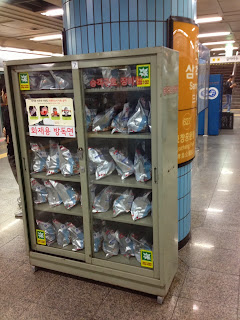Sorry about the title - the coffee shop we're in is playing R. Kelly's "I Believe I Can Fly" right now, and we couldn't come up with a title.
So
it’s been about six weeks since our last post. As noted in our “12 Things We’reLearning As Twenty Somethings” list, being
disciplined bloggers has ended up being more difficult than we
first expected.
 | ||
| our matching PJS Christmas morning, a very Korean Christmas gift from G's co-teachers |
The
past six weeks have been quite nice. We both finished our first semester of
teaching on December 26th, we celebrated our first Christmas in another
country, we took an awesome (we mean AWWWWWSOOOOMEEEEE!) ski trip to
Pyeongchang where the 2018 winter Olympics will be hosted, we coordinated and
ran our Winter English Camps, and we’ve had a ton of refreshment time.
Everything about our ski trip was great, but the two highlights were our daily trips to the lodge at the top of the mountain for churros and hot chocolate, and our experience at a very Korean (read: very naked) indoor water-park with the funnest water slide we've ever been on in our life.
An
interesting aspect of our teaching contracts here in Korea is that we are
required to teach two English camps during the interim periods of their school
year. So this January we both taught an English Winter Camp where we were
responsible for creating and organizing the theme, curriculum, and materials. We were super nervous, and it required a lot of prep-work, but it has been our most rewarding teaching experience so far.
.jpeg) |
| G's students presenting their team country. |
Garrett’s
winter camp started on January 6th and went for two weeks, finishing on January
17th. He taught two separate camps each day, one two hour 5th grade camp and
one two hour 4th grade camp. Each camp had roughly 15 students attend on any
given day. The theme for the two week camps was, “Exploring Our World,” which
went over really well with the students.
A
major aspect of the camp was the student’s “World Explorer Passports,” which
involved students competing to earn the most stamps each day by participating
in various activities, games, or completing homework assignments. This was a
great incentive for the students to remain attentive and engaged throughout the
camp.
Each
day had it’s own sub-theme, such as famous landmarks day, culture day, sports
day, save the planet day, etc.
Andie’s
winter camp started a week later and lasted just four days. Though a shorter
camp, Andie’s camps were more intensive each day. Teaching 3 different camps
each day. Andie’s camp themes where “5 senses” for grades 1 and 2, “Superheros”
for grades 3 and 4, and “Make Your Own Board Game” for 5 and 6.
Andie’s
favorite activity was having her 3 and 4th graders create their own
super heroes. She surprised them the following day by having created a
yugio/pokemon style trading card game with the superheros they’d created. Here
is a short video clip of the students playing the game and a small glimpse into
the general chaos of our classrooms.
Two things to note: 1. the first kid's matching shirt and pants outfit. 2. Their natural inclination to sit on the floor.
Number 1 = super 90s. Number 2 = super Korean.
 |
| G upon realizing we aren't getting any more free tangerines. |
Thanks
to a surprise change of heart, both of our schools gave us permission to not
come into work this whole past week, which meant that we were given an extra
week of vacation time BEFORE our real
vacation time starts on Monday! We were both so pumped when we heard the news.
We have spent almost every day working on our computers at our favorite coffee
shop by our apartment, although they’ve stopped bringing us complementary tangerines and
refill Americanos – so we may have over extended our welcome! Ooops.
To
make this month even better, next week brings us something we’ve been looking
forward to for long time... ANDIE’S PARENTS ARE COMING TO KOREA!!!!
They
will arrive on Tuesday and stay for ten days through Thursday, February 6th. We
are SO excited to have them out here. We have quite the trip planned for them,
including sightseeing in Seoul, showing them around our hometown of Yesan, and
taking them to church-y with us on Sunday. Definitely stay tuned for another
update on the fun we have showing them around our Korea.
Until
next time, Peace!






.JPG)
.JPG)
.JPG)
.JPG)
.JPG)













































